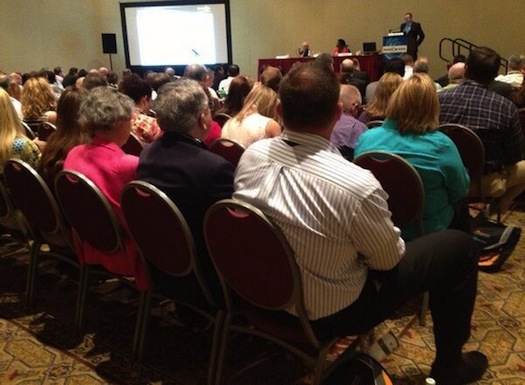The great ones make it looks so easy, but effective storytelling is no easy matter.
It’s both a craft and an art form and these experts explained how at this week’s RadioShow.
Valerie Geller – President, Geller Media & author Beyond Powerful Radio
Phil Hendrie – the syndicated Phil Hendrie Show
Turi Ryder – anchor on the America Weekend
We live in a world filled with distractions. There has never been an age where radio has needed more cut-through. Have you ever been out for dinner and seen a group of people glued to their iPhones? Nobody is actually talking to each other anymore.
Stories are the gold and are the power of radio. “Radio is the equivalent of eye contact” says Geller. “The crack
cocaine of engagement is the sentence ‘let me tell you a story.’ The moment someone listening wonders ‘I wonder what happens next?’ the worm is on the hook. This is the essence of communication.”
Of course there’s always the question of knowing what is going to make a good story. Phil answers that one: “You have to enjoy yourself when you’re telling the story. You have to genuinely be interested in what you’re about to say. Don’t hold back any of the details, be authentic. Interested is Interesting. Bored is boring – be compelled by your own story!”
You need to ask yourself – would I listen to this story?
The way you start your story is the most important.
News reports often begin with ‘who.’ Good storytellers should never begin their story this way.
A good story should always begin with the ‘what.’ Instead of saying, “according to the traffic reports there is a major car accident on the Oak Highway.” flip this around and put the ‘what’ before the ‘who.’ For example, “if you’re travelling down Oak Highway, listen up! There is a traffic accident according to a recent traffic report.”
Valerie explains “Speak with a paintbrush. Describe things visually. Listeners want to picture themselves in your story. Don’t make the story about yourself. The easiest way to engage people in your story – use the word YOU. ‘You’ is the most powerful word in the English language…invite people into the story you’re telling. It’s important to speak to one person at a time.”
It’s easy enough to say all of this, but how do we apply these ideals and actively improve our own storytelling skills?
Turi advises, “speak to REAL people. You need to practice before a real life audience so you can see physically whether your audience is engaged, especially since we don’t have that luxury whilst on air.”
Valerie insists “there are no boring stories, only boring story tellers.” Your sole goal as a storyteller on radio is to remove the radio completely and to make your listener feel as if you are actuallyin the room with them.
 Kristie Mercer is reporting from the NAB RadioShow for radioinfo.
Kristie Mercer is reporting from the NAB RadioShow for radioinfo.

